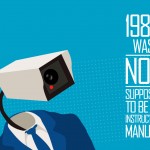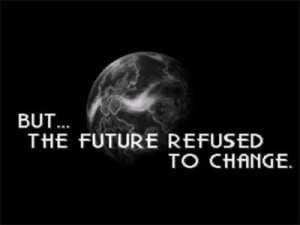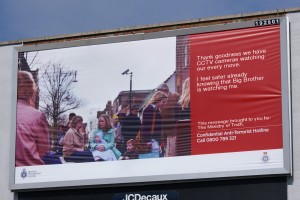There are 3 lessons (out of many) that it seems like we still haven’t learned from George Orwell’s dystopian novel 1984. Briefly, they are:
- Pervasive government surveillance is bad.
- Censorship/rewriting history is bad.
- Constant fear of an unseen external enemy is a great way to control people.
Sound familiar?
Another way to put it is that we have learned these lessons, but that we just chose to ignore them. Either way, the effect is the same.
Let’s take these one at a time, shall we?
Pervasive government surveillance is bad. Specifically, the kind of pervasive surveillance where: the government might be watching you at any time; you have no idea if you’re being watched; and there is little or no oversight.
Think about how different your daily behavior – and I’m talking about all of your behavior, from the moment you get out of bed in the morning to when you go to sleep at night – would be if you knew that someone was watching you every single moment of every single day.

Remember: some surveillance is fine, on a small scale, but ubiquitous surveillance by a single controlling entity is absolutely not OK.
For a free society to function, people need to be “secure from unreasonable searches and seizures,” which also implies having a bit of privacy. The principle of “innocent until proven guilty” is also quite important – but if everyone is under surveillance, there’s a sort of presumption of guilt in that, which implies that everyone is guilty, they just haven’t been caught on tape yet (but they will be!).
Censorship/rewriting history is bad. Censorship on its own is bad enough, but once you start censoring non-fiction, you are effectively re-writing history (or the historical record, anyway).
For a free society to function, the people must be able to find out the truth. When things are censored or re-written, it becomes impossible to find out the truth (as most people understand the meaning of “truth”). Instead, “truth” becomes what the censor believes should be the truth, instead of what actually is (or was). Drawing from the novel 1984 again, this is more along the lines of what O’Brien says the truth is (i.e., whatever The Party says it is) as opposed to what Winston believes it is (an external thing that can’t be altered or covered up).
Which version of “truth” would you prefer?
Constant fear of an unseen enemy is a great way to control people. Some people will by now be getting tired of me harping on this point again and again, but it really is the most important point we can draw from 1984. In fact, this is one of the founding principles of the dystopian government described in the book – that it doesn’t matter who you are at war with, as long as there is always an enemy to direct your hate at, then people can be easily controlled and will willingly go along with things they would otherwise morally oppose.
Parallels to Today
All three of the points I’ve made above can be seen in greater or lesser degrees in our society today. We may not have the telescreens from 1984, but we do have security cameras almost everywhere – in stores, in banks, in malls, in restaurants, in public buildings, in public places, and on public roads. On top of all the cameras, our phones have GPS built in, our cameras can “tag” photos with GPS coordinates (telling people where we were when we took the photo), web sites can use location-awareness to pin down your location (generally accurate, but not pinpoint accurate… yet), and of course our phones and email can be tapped/record/read by police/government agents at any time, without our knowledge, and often without any sort of civil or judicial oversight. There is a famous quote by the Englishman William Pitt, Earl of Chatham, from 200 years ago that is still applicable today: If society has regressed to where power alone is sufficient for government action, we have a police state.
Fortunately, at least here in the US, censorship and the re-writing of history has not come as far as it has in some countries (e.g., China). However, that’s not to say that we’re not on our way towards stricter censorship. Politicians, political pundits, and others will frequently reverse their position on an issue, and then deny that they ever held any other position but the one they have right now. If this doesn’t strike anyone as a perfect example of Doublethink, then I don’t know what would. And once people start thinking that way, it is inevitable that they will want to re-write history to match what they think… and on that path lies madness.
As for the constant fear aspect, well, I hardly need to provide examples, considering that we’ve had a constant “enemy” for nearly 80 years now. It started, in large part, back in World War II, with the Nazis – who were of course quite real! But after that, our fear shifted to the Soviet Union and Communism – so much so that we started turning in people around us for fear that they were communists, and accusing people left and right of deviating from the “party line.” (Just read up on McCarthyism for a chilling look at how fear of an unseen enemy made people behave.) During that time, not agreeing with the ruling class’s political beliefs was enough to get you thrown in jail. Again, does any of this sound familiar? Because it should, seeming as it does to be drawn almost verbatim from George Orwell’s novel!
Of course, since the collapse of the Soviet Union we had to find something else to fear, and it took us a little while to find it – but find it we did, under the increasingly broad definition of “terrorism.” There’s a lot of parallels between our old imagined enemies of the communist era and our new imagined “terrorist” enemies:
- They are from a foreign country, naturally (one that few of us have been too, so it seems even more foreign to most of us – because “foreigners are scary”).
- They could be anywhere – even hiding in plain sight! They might even be someone you already know! (“Be afraid of everyone, even your friends.”)
- They could strike us at any time! (“Always be afraid.”)
- Not content with the explanation of “some people are fighting against us because they disagree very strongly with us,” we’ve somehow morphed things into some sort of EPIC BATTLE, because it’s our ideals and principles against theirs, and of course we have to win because THERE CAN BE ONLY ONE.
- If you disagree with the idea that this is an EPIC BATTLE which we MUST FIGHT and MUST WIN because there is NO OTHER CHOICE IF WE WANT TO SURVIVE then you are branded as UN-AMERICAN.
Given all of these parallels, you’d think at least someone would maybe stop and point them out and sort of deflate the rhetoric being tossed around to justify all of the above – but no, sadly, no.
In the end, most people are more interested in other things – maybe the economy, or more likely what was on Lost or The Bachelor last night. So we just ignore what’s going on, forget the history lessons we were taught in school (assuming it’s still being taught in school – I worry sometimes), and march towards a future that is, sadly, just like the past… because we refused to learn from it.

